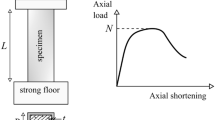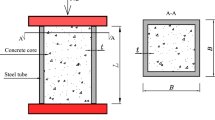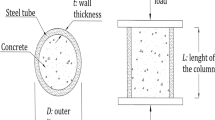Abstract
Concrete-filled steel tubes (CFSTs) are widely used in engineering structures due to their excellent mechanical properties and economic benefits. This study focused on the construction of artificial neural network (ANN) models with high prediction capabilities and prediction accuracies that could predict the axial compression load capacities of short CFST columns using machine learning methods. A database was created by searching literature published over the past 40 years regarding circular-CFST bearing-capacity testing. Three ANN models with different input parameters were developed, and used the Whale Optimization Algorithm to optimize the network weights and thresholds, the core idea of which comes from the humpback whale's special bubble net attack method. Then, the predictions of the proposed machine learning models were also compared with the theoretical values produced by the formulas proposed in existing codes. The results show that the ANN models had higher accuracies and a wider application range than the existing code models. Based on the Garson's algorithm, we perform parameter sensitivity analysis on the network model to enhance the interpretability of the neural network model. Finally, a graphical user tool is built to make the strength of CFST can be predicted quickly.














Similar content being viewed by others
References
AIJ. (2008). Recommendations for design and construction of concrete filled steel tubular structures. Architectural Institute of Japan.
Allouzi, R. A., Almasaeid, H. H., et al. (2022). Prediction of bond-slip behavior of circular/squared concrete-filled steel tubes. Buildings, 12(456), 456. https://doi.org/10.3390/buildings12040456
Altai, S., Orton, S. L., Hussein, F. M., & Chen, Z. (2023). Experimental and numerical study on the collapsing behavior of structural systems with steel members arranged in parallel under tension. International Journal of Steel Structures, 23(2), 493–502. https://doi.org/10.1007/s13296-022-00707-x
ANSI/AISC 360. (2010). Specification for structural steel buildings. Chicago: American Institute of Steel Construction.
Avci-Karatas, C. (2022). Artificial neural network (ANN) based prediction of ultimate axial load capacity of concrete-filled steel tube columns (CFSTCs). International Journal of Steel Structures, 22(5), 1341–1358. https://doi.org/10.1007/s13296-022-00645-8
Behnood, A., Behnood, V., Gharehveran, M. M., & Alyamac, K. E. (2017). Prediction of the compressive strength of normal and high-performance concretes using M5P model tree algorithm. Construction and Building Materials, 142, 199–207. https://doi.org/10.1016/j.conbuildmat.2017.03.061
Bridge, R., Patrick, M., & Webb, J. (1997). High strength materials in composite construction. In Composite constructive-conventional and innovative (Innsbruck, 16-18 September 1997) (pp. 29-40).
BS 5400. (2005). Steel concrete and composite bridges, Part 5: Code of practice for design of composite bridges. British Standards Institutions.
Cai, S., & Jiao, Z. (1984). Basic performance and strength calculation of steel-concrete short columns. Journal of Building Structures, 5(6), 13–29. https://doi.org/10.14006/j.jzjgxb.1984.06.002
Carlos, Z., & Hannes, B. (2022). Scientific exploration and explainable artificial intelligence. Minds & Machines, 32(1), 219–239. https://doi.org/10.1007/s11023-021-09583-6
Ceryan, N., Ozkat, E. C., Can, C. K., et al. (2021). Machine learning models to estimate the elastic modulus of weathered magmatic rocks. Environmental Earth Sciences, 80, 448. https://doi.org/10.1007/s12665-021-09738-9
Eurocode 4. (2004). Design of composite steel and concrete structures-Part 1.1: General rules and rules for buildings, European Committee for Standardization. British Standards Institution.
Feng, D. C., Liu, Z. T., Wang, X. D., Jiang, Z. M., & Liang, S. X. (2020). Failure mode classification and bearing capacity prediction for reinforced concrete columns based on ensemble machine learning algorithm. Advanced Engineering Informatics, 45, 101126. https://doi.org/10.1016/j.aei.2020.101126
Foraboschi, P. (2020a). Predictive formulation for the ultimate combinations of axial force and bending moment attainable by steel members. International Journal of Steel Structures, 20(2), 705–724. https://doi.org/10.1007/s13296-020-00316-6
Foraboschi, P. (2020b). Optimal design of seismic resistant RC columns. Materials, 13(8), 1919. https://doi.org/10.3390/ma13081919
Garson, G. D. (1991). Interpreting neural-network connection weights. AI Expert, 6(4), 46–51.
GB 50010. (2015). Code for design of concrete structure. China Architecture & Building Press.
GB 50936–2014. (2014). Code for design of concrete-filled steel tubular structures. China Architecture & Building Press.
GB/T 50081. (2019). Standard test methods for physical and mechanical properties of concrete. China Architecture & Building Press.
Golafshani, E. M., & Behnood, A. (2018). Application of soft computing methods for predicting the elastic modulus of recycled aggregate concrete. Journal of Cleaner Production, 176, 1163–1176. https://doi.org/10.1016/j.jclepro.2017.11.186
Han, L. H. (1996). Concrete filled steel tubular columns-state of the art. Industrial Construction, 1996(03), 23–27. https://doi.org/10.13204/j.gy.jz.1996.03.006
Han, L. (2016). Steel Reinforced concrete structures: theory and practice. Science Press.
Hornik, K., Stinchcombe, M., & White, H. (1989). Multilayer feedforward networks are universal approximators. Neural Networks, 2(5), 359–366. https://doi.org/10.1016/0893-6080(89)90020-8
Horváth, A., Kollár, D., & Kövesdi, B. (2022). Behaviour of CFST stub columns subjected to pure compression. International Journal of Steel Structures, 22(4), 1175–1188. https://doi.org/10.1007/s13296-022-00628-9
Ibrahim, O. M. (2013). A comparison of methods for assessing the relative importance of input variables in artificial neural networks. Journal of Applied Sciences Research, 9(11), 5692–5700.
Keshtegar, B., Bagheri, M., & Yaseen, Z. M. (2019). Shear strength of steel fiber-unconfined reinforced concrete beam simulation: Application of novel intelligent model. Composite Structures, 212(2019), 230–242. https://doi.org/10.1016/j.compstruct.2019.01.004
Kohonen, T. (1988). An introduction to neural computing. Neural Networks, 1(1), 3–16. https://doi.org/10.1016/0893-6080(88)90020-2
Lai, B., Liew, J. Y., & Xiong, M. (2019). Experimental study on high strength concrete encased steel composite short columns. Construction & Building Materials, 228, 116640. https://doi.org/10.1016/j.conbuildmat.2019.08.0216
Sai, L., & Huajing, F. (2017). A WOA-based algorithm for parameter optimization of support vector regression and its application to condition prognostics. In 2017 36th Chinese control conference (CCC) (pp. 7345-7350). IEEE.
Luat, N. V., Han, S. W., & Lee, K. (2021). Genetic algorithm hybridized with eXtreme gradient boosting to predict axial compressive capacity of CCFST columns. Composite Structures, 278, 114733. https://doi.org/10.1016/j.compstruct.2021.114733
Mirjalili, S., & Lewis, A. (2016). The whale optimization algorithm. Advances in Engineering Software, 2016, 95. https://doi.org/10.1016/j.advengsoft.2016.01.008
Nguyen, H., Vu, T., Vo, T. P., et al. (2021). Efficient machine learning models for prediction of concrete strengths. Construct. Build. Mater, 266, 120950. https://doi.org/10.1016/j.conbuildmat.2020.120950
Nguyen, T. H., Tran, N. L., & Nguyen, D. D. (2022). Prediction of axial compression capacity of cold-formed steel oval hollow section columns using ANN and ANFIS models. International Journal of Steel Structures, 22(1), 1–26. https://doi.org/10.1007/s13296-021-00557-z
Nikbin, I. M., Rahimi, S., & Allahyari, H. (2017). A new empirical formula for prediction of fracture energy of concrete based on the artificial neural network. Engineering Fracture Mechanics, 186(2017), 466–482. https://doi.org/10.1016/j.engfracmech.2017.11.010
Nitish, S. J., Mir, I. U. H., & Ankush, R. (2023). Evaluation and prediction of frictional behavior of AA 2024 based hybrid composites using ANN model. Proceedings of the Institution of Mechanical Engineers, Part j: Journal of Engineering Tribology, 237(4), 843–859. https://doi.org/10.1177/13506501221118464
Parviz, S., Hesam, D., & Ramin, R. (2022). Forecasting of WTI crude oil using combined ANN-Whale optimization algorithm. Energy Sources, Part b: Economics, Planning, and Policy, 17(1), 2083728.
Sandeep, M. S., Koravith, T., Sakdirat, K., et al. (2023). Shear strength prediction of reinforced concrete beams using machine learning. Structures, 47, 1196–1211. https://doi.org/10.1016/j.istruc.2022.11.140
Siu, C. (2017). Day32: Variable Importance in ANNs. https://csiu.github.io/blog/update/2017/03/28/day32.html
Su, M., Peng, H., & Li, S. (2021). Application of an interpretable artificial neural network to predict the interface strength of a near-surface mounted fiber-reinforced polymer to concrete joint. Journal of Zhejiang University-SCIENCE A, 22(6), 427–440. https://doi.org/10.1631/jzus.A2000245
Tran, V. L., Thai, D. K., & Nguyen, D. D. (2020). Practical artificial neural network tool for predicting the axial compression capacity of circular concrete-filled steel tube columns with ultr-high-strength concrete. Thin-Walled Structures, 151, 106720. https://doi.org/10.1016/j.tws.2020.106720
Tusshar, G., & Aditya, K. T. (2018). Finite element modeling of circular concrete filled steel tube (CFST). Indian Journal of Science and Technology, 11(34), 1–9. https://doi.org/10.17485/ijst/2018/v11i33/130853
Vu, Q. V., Truong, V. T., & Thai, H. T. (2021). Machine learning-based prediction of CFST columns using gradient tree boosting algorithm. Composite Structures, 259, 113505. https://doi.org/10.1016/j.compstruct.2020.113505
Yang, W., Xia, K., Fan, S., Wang, L., Li, T., Zhang, J., & Feng, Y. (2022). A Multi-strategy whale optimization algorithm and its application. Engineering Applications of Artificial Intelligence, 108, 104558. https://doi.org/10.1016/j.engappai.2021.104558
Yu, L. S., Liu, B., Wang, L., et al. (2023). Experimental study on axial compression performance of CFST stub columns under very-cold ambient temperature. China Civil Engineering Journal, 56(10), 20–31. https://doi.org/10.15951/j.tmgcxb.22040426
Yu, Z. W., Ding, F. X., & Lin, S. (2002). Researches on behavior of high-performance concrete filled tubular steel short columns. Journal of Building Structures, 02, 41–47. https://doi.org/10.14006/j.jzjgxb.2002.02.006
Zhou, Z. (2016). Machine learning (pp. 97–115). Tsinghua University Press.
Funding
The authors would like to acknowledge the Special Funds for Guiding Local Scientific and Technological Development by The Central Government (Grant No. 22ZY1QA005), the Project Supported by the Young Scholars Science Foundation of Lanzhou Jiaotong University (Grant No. 2022055), and the young doctor support project in Colleges and universities of Gansu Province (Grant No. 2023QB-045). The authors gratefully express their gratitude for this financial support.
Author information
Authors and Affiliations
Corresponding author
Ethics declarations
Conflict of interest
The author(s) declared no potential conflicts of interest with respect to the research, authorship, and/or publication of this article.
Additional information
Publisher's Note
Springer Nature remains neutral with regard to jurisdictional claims in published maps and institutional affiliations.
Rights and permissions
Springer Nature or its licensor (e.g. a society or other partner) holds exclusive rights to this article under a publishing agreement with the author(s) or other rightsholder(s); author self-archiving of the accepted manuscript version of this article is solely governed by the terms of such publishing agreement and applicable law.
About this article
Cite this article
Lusong, Y., Yuxing, Z., Li, W. et al. Prediction of the Axial Bearing Compressive Capacities of CFST Columns Based on Machine Learning Methods. Int J Steel Struct 24, 81–94 (2024). https://doi.org/10.1007/s13296-023-00800-9
Received:
Accepted:
Published:
Issue Date:
DOI: https://doi.org/10.1007/s13296-023-00800-9




